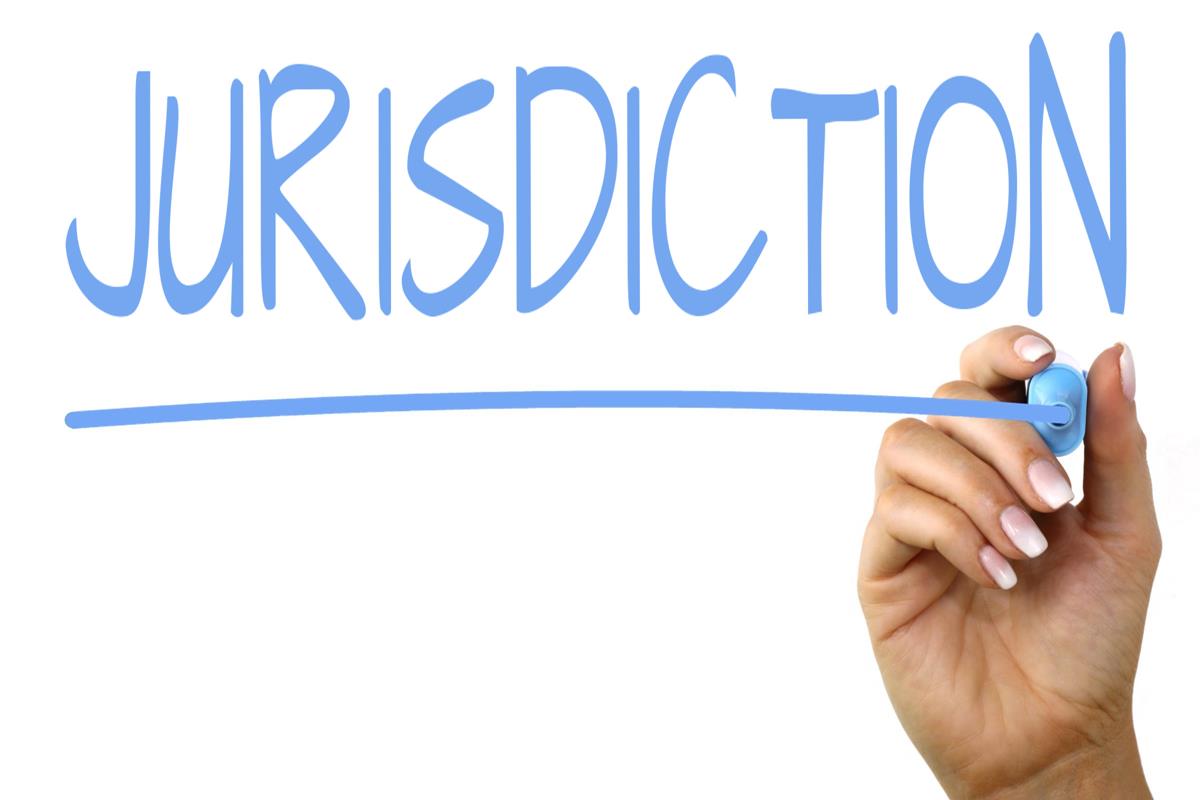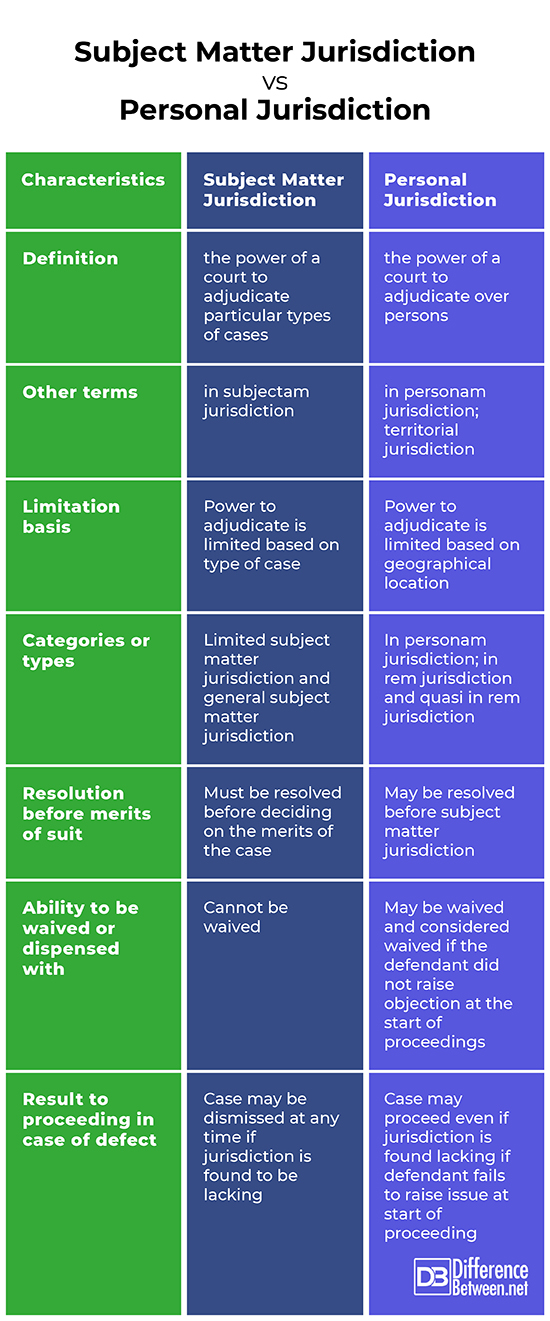Difference Between Subject Matter Jurisdiction and Personal Jurisdiction
Subject matter jurisdiction and personal jurisdiction are the two main types of judicial jurisdiction, the power of courts to adjudicate or pass and enforce judgment. Jurisdiction is a type of limitation placed over judicial courts to safeguard fairness and ensure due process hence must be determined at the start of court proceedings. Without jurisdiction, trial courts either cannot adjudicate or their judgment can be overturned or considered null and void if proven that the court did not have jurisdiction in the first place. These two types of jurisdictions do not overlap and can be determined independent of each other, but must both be present for a judgment to be valid.
The definition and differences between subject matter and personal jurisdiction are pretty straightforward. This article will focus on the definitions of each, the scope, and types or categories of each of the two. These are discussed further below.

What is Subject Matter Jurisdiction?
Subject matter jurisdiction, also sometimes called in subjectam jurisdiction, is the power of a court to hear and decide over a particular type of case and a limitation to adjudicate only that specific subject matter. There are two types of subject matter jurisdiction. The first is limited subject-matter jurisdiction. Courts may be restricted in the kind of cases they can adjudicate. For example, a criminal court can only hear cases of criminal action; a family court can only hear cases like marriage, divorce and child custody; while a land court can hear disputes over land ownership. The federal courts in the United States also have limited subject matter jurisdiction and is also mostly where issues on subject matter jurisdiction become confusing. The second type is general subject matter jurisdiction. There are courts that can hear most types of cases and have this second type of subject matter jurisdiction and these can hear cases over which no other court has exclusive jurisdiction. Examples of these are superior courts and supreme courts.
Subject matter jurisdiction must be resolved before the merits of a case may be considered. This type of jurisdiction is extra special in that it cannot be waived or dispensed with. This means that the parties to a case cannot give authority to court to decide over the matter at hand if the court does not have that authority in the first place. A case may be dismissed even halfway through a trial, or a decision may be overturned, if subject-matter jurisdiction of the court is somehow found to be lacking. A defendant may raise the issue or object to the lack of subject-matter jurisdiction at any time, even after judgment has been given by the court. The court itself can also raise the issue of this type of jurisdiction even if neither party raised the issue.

What is Personal Jurisdiction?
Personal jurisdiction, also called in personam jurisdiction or sometimes territorial jurisdiction is the power of the court to hear a case and enforce its judgment over persons or things. Personal jurisdiction limits a court’s power to adjudicate based on geographical location.
There are three types of personal jurisdiction and these are in personam jurisdiction, in rem jurisdiction and quasi in rem jurisdiction. “In personam jurisdiction” permits a court to give a judgment that is personally binding on the defendant. “In rem jurisdiction” permits a court to adjudicate the rights of all possible claimants to a particular piece of property. “Quasi in rem jurisdiction” has two further types. The first allows a court to determine the rights of particular parties over property they control and the second type allows the court to decide over a defendant’s property – but not the defendant personally – to use the property to satisfy a plaintiff’s personal claim against the defendant.
Challenges to or issues with personal jurisdiction must also be resolved before the proceedings can move forward. A defendant can raise objections to a court’s personal jurisdiction or can waive personal jurisdiction by giving consent. Also, if a defect in the personal jurisdiction of the court is later found but the defendant did not raise any objection at the start of the proceedings, personal jurisdiction is said to be waived, the case proceeds as normal and decisions are binding and valid.
Difference between Subject Matter Jurisdiction and Personal Jurisdiction
Definition
Subject matter jurisdiction refers to the power of a court to adjudicate particular types of cases while personal jurisdiction refers to the power of a court to adjudicate over persons.
Other Terms
Subject matter jurisdiction is also called “in subjectam jurisdiction” while personal jurisdiction is also called “in personam jurisdiction” and territorial jurisdiction.
Basis of Limitation of Power
Subject matter jurisdiction limits the power of a court based on subject matter of the case while personal jurisdiction limits a court’s power based on geographical location.
Categories or Types
Subject matter jurisdiction has two types; limited subject matter jurisdiction and general subject matter jurisdiction. Personal jurisdiction has three types; “in personam jurisdiction”, “in rem jurisdiction”, and “quasi in rem jurisdiction”.
Resolution before Merits of Suit
Subject matter jurisdiction must be resolved before reviewing the merits of a suite while personal jurisdiction may be resolved before subject matter jurisdiction.
Ability to be Waived or Dispensed With
Subject matter jurisdiction may not be waived or dispensed with by any party whereas personal jurisdiction may be waived, especially by the defendant, and also considered waived if the defendant does not raise the issue of lack of jurisdiction at the start of a proceeding.
Result to Proceeding in Case of Defect
In case of defect or lack of subject matter jurisdiction, a case may be dismissed at any time, even in the middle of a trial or after judgment has been given. In case of a lack of personal jurisdiction, a case may continue if defendant does not raise the issue at the start of proceedings.
Subject Matter Jurisdiction vs Personal Jurisdiction

Summary Subject Matter Jurisdiction and Personal Jurisdiction
- Subject matter jurisdiction and personal jurisdiction are the two main types of judicial jurisdiction, the limits to power placed upon a judicial court to ensure fairness and due process.
- These two types of jurisdiction are distinct from each other and do not overlap.
- Both must be established in order for a case to proceed.
- A defect in subject matter jurisdiction may dismiss a case or nullify a decision. Either party, including the court may raise the issue at point in the proceedings.
- Personal jurisdiction may be waived and considered waived if a defendant does not raise the issue at the start of the proceedings.
- Difference Between Hematoma and Melanoma - February 9, 2023
- Difference Between Bruising and Necrosis - February 8, 2023
- Difference Between Brain Hematoma and Brain Hemorrhage - February 8, 2023
Search DifferenceBetween.net :
1 Comment
Leave a Response
References :
[0]Berch, Jessica. "Waiving Jurisdiction." Pace Law Review 36, no. 3 (2016): 853-907. Print.
[1]Marcus, Richard L., and Thomas D. Rowe Jr. Gilbert Law Summaries on Civil Procedure. Chicago, IL: Thomson West, 2008. Print.
[2]Subrin, Stephen, and Margaret Woo. Litigating in America: Civil Procedure in Context. New York, NY: Aspen Publishers, 2006. Print.
[3]Image credit: http://www.thebluediamondgallery.com/handwriting/images/jurisdiction.jpg
[4]Image credit: http://www.picserver.org/images/highway/phrases/jurisdiction.jpg

This is enlightening, concise and very well presented in a fairly clear matter. Jurisdiction, fairness and due process are of paramount importance for any legitamate court, country, land, possession or personal human being! I can speak from personal experience of when I was pushed//manipulated/coerced into attending and being a part of a corrupt, dishonest, and post-secondary kangaroo “court”. I was basically setup with collusion, slander/libel, character defamation/assasination and all the forced upon shame that was apart of it. I lost my education opportunity for a degree/diploma, went into a deep depression/anxiety, worry, of huge Toxic stress, coped as long as I could alone until telling some family an then tried to suck it up like a man which led to quick deterioration of my emotional, psychological, mental, spiritual and physical life an well being. Memory problems, attention issues, motivation, energy, hairloss, unhealthy eating/drinking/sleeping/thinking coping mechanisms were also consequences of being falsely accused, tried by fake “jury/judge” misconduct board, and then ostrasized by my program dean/chair/profs of my department program and then persecuted with a dishonest course program grievance (power/control grab an Jurisdiction issue again) of not being able to finish my education. Then setup by the false accusers and then the institution overtly prevented me from continuing my schooling all due to lies, slander, gossip, fear of the unknown and personal subjective biased so called evidence. Objective facts were no-where to be found here, but I guess thats to be expected in a kangaroo court run by people who dont understand due process, justice, and jurisdiction. Have set me back almost 8-10 yrs by the fallout. Anyways, guess no body comments here but I did see how innocent people get convicted in courts thru UN-due process and fake jurisdiction by imposter judges an juries. Thanks for the good write up on jurisdiction!